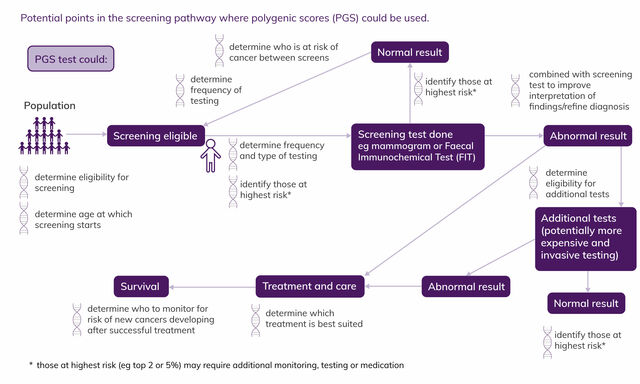NEW: Where might polygenic scores have an impact in future screening pathways? View the infographic
The use of comprehensive risk prediction models that include genetic, environmental and lifestyle risk factors, are being trialled for stratified screening programmes. The results from these trials are imminent in the next few years and when they arrive they will provide evidence on whether risk prediction using polygenic scores can improve risk prediction for cancer and contribute towards stratified screening.
What is a screening programme?
Screening is the systematic testing of healthy individuals to identify those with a disease, potentially even before their symptoms appear. It is an important aspect of disease control and can support diagnosis and treatment of early stage disease, with the aim of reducing illness and death. Screening programmes have contributed to improvements in public health, for example newborn blood spot screening which helps identify several rare but serious diseases.
Cancer screening
Among screening programmes are those for common cancers such as breast, cervical and colorectal cancer. Cancer screening programmes aim to reduce delays and barriers to diagnosis, treatment and care of cancer. Given that many therapies work better the earlier in the disease they are started, many health systems focus prevention efforts on screening to support early detection.
In cancer screening programmes, selection for a screening test is commonly based on age and sex. Because the risk of developing a cancer increases with age, individuals are targeted for screening according to age. Being female or male is also an important risk predictor of some cancers, for example women are much more likely to develop breast cancer than men. Therefore, breast cancer screening programmes focus on women rather than men. There are also situations where individuals may enter a programme at an earlier age, for example if they are known to have a strong family history of cancer, which increases their risk of a cancer developing at a young age.
Limitations of current cancer screening programmes
While cancer screening can save lives, screening programmes are resource intensive – they screen large numbers of people, often multiple times during a lifetime. They also come with associated risks, such as overdiagnosis, where screening detects evidence of disease that would not have become apparent during that person’s lifetime i.e. they would not have become ill. In these instances, screening could lead to unnecessary, often difficult, or expensive care and treatment.
Improving screening programmes
In practice, cancer screening programmes target individuals according to their risk – the risk of a cancer associated with their age or sex. But this is very broad risk assessment and is a one-size fits all strategy. By extending the risk criteria to include other factors, such as genetic risk, screening has the potential to support higher rates of diagnosis, more effective early treatments, whilst sparing lower risk people from the risks and inconvenience of screening and overtreatment. This could be achieved by focusing efforts on those at highest risk of developing disease or adapting the screening frequency and tests according to different levels of risk. A more personalised risk assessment that would enable stratification based on the risk level of an individual requires a way to accurately predict the risk of a cancer developing.

Predicting risk of cancer
Cancer is a complex disease with numerous risk factors associated with their development, for example smoking and lung cancer or UV exposure and skin cancer. Risk prediction models, which consider these known risk factors have been developed in cancers for which there are existing screening programmes. Initial economic analyses looking at the impact of risk-stratified strategies on screening programmes indicate this approach could be cost-effective but will require accurate risk prediction models.
Polygenic scores are being considered as a measure of the genetic risk for developing a disease. There are expectations that risk prediction models that use polygenic scores can improve the accuracy of disease risk prediction, generating better outcomes for patients. The inclusion of polygenic scores in risk prediction models will depend on the contribution they make to the accuracy of the risk prediction, either instead of or in combination with other risk factors. Ultimately though the routine adoption of a risk prediction that uses a polygenic score within a screening programme will depend on the clinical impact and cost-effectiveness of stratified screening programmes.
Improving current screening tests
Risk predictions that use a polygenic score could also potentially improve the performance of current screening tests, such as faecal immunochemical testing (FIT) for colorectal cancer and mammograms for breast cancer.
When a screening test result is positive, additional tests are required to confirm the cancer is present. These can be invasive and expensive procedures such as needle biopsies, colonoscopies or endoscopy. Polygenic scores could provide estimates to help select who could benefit the most from undergoing these additional tests.
Where could polygenic score be used in cancer screening?
There are numerous points along the screening pathway where decisions on inclusion of an individual for screening are taken – from the eligibility criteria for screening to the treatment and care of the patients. These points could make use of risk predictions from a polygenic score. Different risk prediction models will need to be developed for each point. More personalised risk assessments that use polygenic scores could be used to determine:
- Eligibility for screening
- Age/s at which screening will be offered
- The type and amount of screening offered based on risk
- Identification of those at the highest risk (for example, of the top 2%).
Polygenic scores in cancer screening and beyond
We look at these topics and more in our latest report – Polygenic scores and cancer. It provides an overview of what is known about polygenic scores and what they could mean for cancer prediction, prevention and management. This short report also sets out the potential areas where implementation into health services is being considered, such as screening, and outlines current gaps in the scientific evidence.
